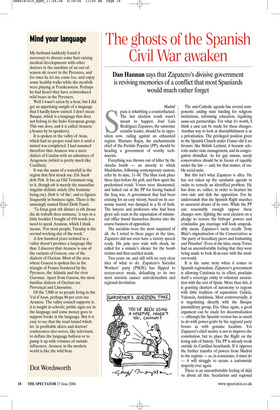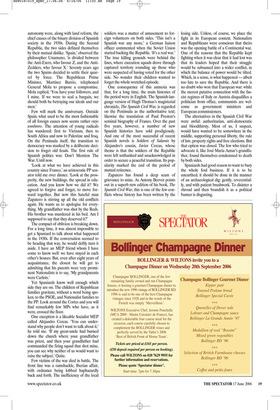The ghosts of the Spanish Civil War awaken
Dan Hannan says that Zapatero’s divisive government is reviving memories of a conflict that most Spaniards would much rather forget
Madrid
Spain is inhabiting a counterfactual. The last election result wasn’t meant to happen. José Luis Rodríguez Zapatero, the saturnine socialist leader, should be in opposition now, railing against an exhausted regime. Mariano Rajoy, the uncharismatic chief of the Partido Popular (PP), should be heading a government of worthy technocrats.
Everything was thrown out of kilter by the Atocha bomb — an atrocity to which Madrileiios, following contemporary custom, refer by its date, 11–M. The blast took place three days before the poll, and blew apart the predestined result. Voters were disoriented, and lashed out at the PP for having backed the Iraq war. A government that had been cruising for an easy victory, based on its economic record, was dumped in a fit of funk. The lawyers and professors who had been given safe seats in the expectation of ministerial office found themselves thrown into the coarse business of opposition.
The socialists were the most surprised of all. As I noted in these pages at the time, Zapatero did not even have a victory speech ready. His pale eyes wide with shock, he called for a minute’s silence for the bomb victims and then scuttled inside.
Two years on, and still with no very clear idea of what to do, Zapatero’s Socialist Workers’ party (PSOE) has flipped to screen-saver mode, defaulting to its two most atavistic causes: anti-clericalism and regional devolution. The anti-Catholic agenda has several components: ending state funding for religious institutions, reforming education, legalising same-sex partnerships. For what it’s worth, I think a case can be made for these changes. Another way to look at disestablishment is as a privatisation. The privileged position given to the Spanish Church under Franco did it no favours: like British Leyland, it became sclerotic under state management, and its congregation dwindled. As for gay unions, surely conservatives should be in favour of equality under the law — and, for that matter, of stable social units.
But this isn’t what Zapatero is after. He has not taken up the secularist agenda in order to remedy an identified problem. He has done so, rather, in order to hearten his own side and dish the opposition. For he understands that the Spanish Right marches to ancestral drums of its own. While the PP can reasonably enough oppose these changes now, fighting the next election on a pledge to restore the bishops’ powers and criminalise gay marriage will look unspeakably mean. Zapatero’s tactic recalls Tony Blair’s stigmatisation of the Conservatives as ‘the party of hereditary peers and foxhunting and Pinochet’. Even at the time, many Tories had an uncomfortable feeling that they were being made to look ill-at-ease with the modern world.
It is the same story when it comes to Spanish regionalism. Zapatero’s government is allowing Catalonia to, in effect, proclaim itself a sovereign entity in voluntary association with the rest of Spain. More than this, it is granting charters of autonomy to regions with little tradition of separatism: Galicia, Valencia, Andalusia. Most controversially, it is negotiating directly with the Basque paramilitary group, Eta. Once again, a good argument can be made for decentralisation — although the Spanish version has as much to do with power-grabs by the regional party bosses as with genuine localism. Yet Zapatero’s chief motive is not to improve the constitution, but to place the Right on the losing side of history. The PP is already weak outside its Castilian heartlands. If it opposes the further transfer of powers from Madrid to the regions — as, in conscience, it must do — it will struggle to secure a nationwide majority ever again.
There is an uncomfortable feeling of déjà vu about all this. Secularism and regional autonomy were, along with land reform, the chief causes of the binary division of Spanish society in the 1930s. During the Second Republic, the two sides defined themselves by their mutual dislike. ‘Spain,’ observed the philosopher Unamuno, ‘is divided between the Anti-Exers, who favour Z, and the AntiZedders, who favour X.’ Seventy years ago the two Spains decided to settle their quarrel by force. The Republican Prime Minister, Martínez Barrio, telephoned General Mola to propose a compromise. Mola replied, ‘You have your followers, and I mine. If we were to seal a bargain, we should both be betraying our ideals and our men.’ Few will mark the anniversary. Outside Spain, what used to be the most fashionable of all foreign causes now seems rather viejo sombrero. The attention of young radicals has wandered: first to Vietnam, then to South Africa and now to Palestine and Iraq. On the Peninsula itself, the transition to democracy was marked by a deliberate decision to forget old feuds. The first rule of Spanish politics was: Don’t Mention The War. Until now.
‘Look at what we have achieved in this country since Franco,’ an aristocratic PP senator told me over dinner. ‘Look at the prosperity, the new buildings, the spread in education. And you know how we did it? We agreed to forgive and forget, to move forward together. But now this hateful man Zapatero is stirring up all the old conflicts again. He wants us to apologise for everything. My grandfather was shot by the Reds. His brother was murdered in his bed. Am I supposed to say that they deserved it?’ The compact of oblivion is breaking down. For a long time, it was almost impossible to get a Spaniard to talk about what happened in the 1930s. If the conversation seemed to be heading that way, he would deftly turn it aside. I have an MEP friend whom I have come to know well: we have stayed in each other’s houses. But, even after eight years of acquaintance, the closest he will get to admitting that his parents were very prominent Nationalists is to say, ‘My grandparents were Carlists.’ Yet Spaniards know well enough which side they are on. The children of Republican families gravitate, without a word being spoken, to the PSOE, and Nationalist families to the PP. Look around the Cortes and you will find remarkably few MPs who have, as it were, crossed the floor.
One exception is a likeable Socialist MEP called Alejandro Cercas. ‘You can understand why people don’t want to talk about it,’ he told me. ‘If my great-uncle had burned down the church where your grandfather was priest, and then your grandfather had commanded the firing squad that shot mine, you can see why neither of us would want to raise the subject.’ Quite.
Few victims of the war died in battle. The front line was a ramshackle, Iberian affair, with ordnance being lobbed haphazardly back and forth. The inefficiency of the local soldiers was a matter of amusement to foreign volunteers on both sides. ‘This isn’t a Spanish war any more,’ a German liaison officer commented when the Soviet Union started backing the Republic. ‘It’s a real war.’ The true killing grounds were behind the lines, where execution squads drove through captured territory rounding up those who were suspected of having voted for the other side. No wonder their children wanted to forget the whole wretched episode.
One consequence of this amnesia was that, for a long time, the main histories of the period were in English. The Spanish-language version of Hugh Thomas’s magisterial chronicle, The Spanish Civil War, is regarded on the Peninsula as the authoritative text; likewise the translation of Paul Preston’s seminal biography of Franco. Over the past five years, however, a number of new Spanish histories have sold prodigiously. And one of the most successful of recent Spanish novels is Soldiers of Salamis by Alejandro’s cousin, Javier Cercas, whose theme is that the soldiers of the Republic were left unthanked and unacknowledged in order to secure a peaceful transition. Its popularity marked the end of the period of mutual reticence.
Zapatero has found a deep seam of grievance to mine. As Antony Beevor points out in a superb new edition of his book, The Spanish Civil War, this is one of the few conflicts whose history has been written by the losing side. Unless, of course, we place the fight in its European context. Nationalists and Republicans were conscious that theirs was the opening battle of a Continental war. One of the reasons that the Republic kept fighting when it was clear that it had lost was that its leaders hoped that their struggle would be subsumed into a wider conflict, in which the balance of power would be tilted. Which, in a sense, is what happened — albeit too late to save the Republic. And there is no doubt who won that European war: while the merest putative connection with the fascist regimes of Italy or Austria disqualifies a politician from office, communists are welcome as government ministers and European commissioners.
The alternatives in the Spanish Civil War were awful: authoritarian, anti-democratic and bloodthirsty. Most of us, I suspect, would have wanted to be somewhere in the middle, supporting personal liberty, the rule of law, property rights and free elections. But that option was closed. The few who tried to advocate it, like José María Aznar’s grandfather, found themselves condemned to death by both sides.
Spaniards had good reason to want to bury the whole foul business. If it is to be unearthed, it should be done in the manner of an archaeological dig: gently, reverentially, and with patient brushwork. To disinter a shroud and then brandish it as a political banner is disgusting.



















































































 Previous page
Previous page